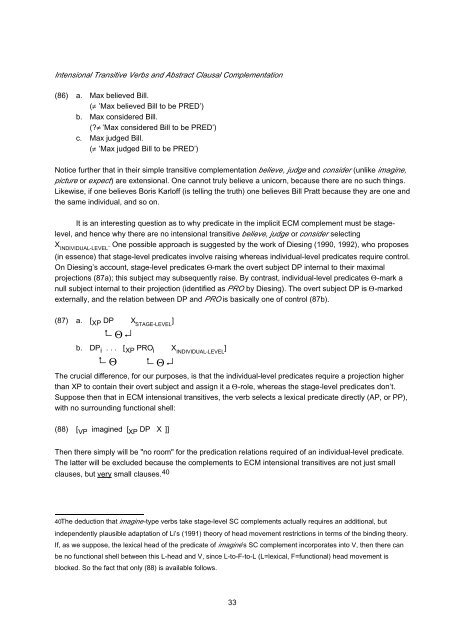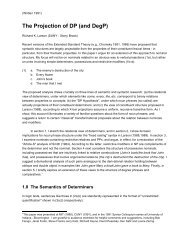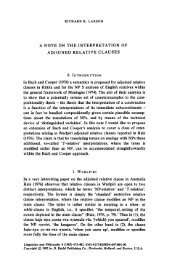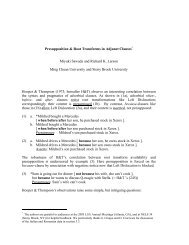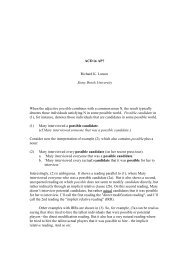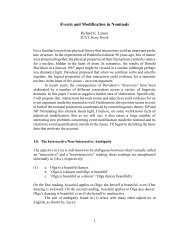Intensional Transitive Verbs and Abstract Clausal Complementation
Intensional Transitive Verbs and Abstract Clausal Complementation
Intensional Transitive Verbs and Abstract Clausal Complementation
Create successful ePaper yourself
Turn your PDF publications into a flip-book with our unique Google optimized e-Paper software.
<strong>Intensional</strong> <strong>Transitive</strong> <strong>Verbs</strong> <strong>and</strong> <strong>Abstract</strong> <strong>Clausal</strong> <strong>Complementation</strong><br />
(86) a. Max believed Bill.<br />
(≠ ’Max believed Bill to be PRED’)<br />
b. Max considered Bill.<br />
(?≠ ’Max considered Bill to be PRED’)<br />
c. Max judged Bill.<br />
(≠ ’Max judged Bill to be PRED’)<br />
Notice further that in their simple transitive complementation believe, judge <strong>and</strong> consider (unlike imagine,<br />
picture or expect) are extensional. One cannot truly believe a unicorn, because there are no such things.<br />
Likewise, if one believes Boris Karloff (is telling the truth) one believes Bill Pratt because they are one <strong>and</strong><br />
the same individual, <strong>and</strong> so on.<br />
It is an interesting question as to why predicate in the implicit ECM complement must be stagelevel,<br />
<strong>and</strong> hence why there are no intensional transitive believe, judge or consider selecting<br />
X INDIVIDUAL-LEVEL . One possible approach is suggested by the work of Diesing (1990, 1992), who proposes<br />
(in essence) that stage-level predicates involve raising whereas individual-level predicates require control.<br />
On Diesing’s account, stage-level predicates Θ-mark the overt subject DP internal to their maximal<br />
projections (87a); this subject may subsequently raise. By contrast, individual-level predicates Θ-mark a<br />
null subject internal to their projection (identified as PRO by Diesing). The overt subject DP is Θ-marked<br />
externally, <strong>and</strong> the relation between DP <strong>and</strong> PRO is basically one of control (87b).<br />
(87) a. [ XP DP X STAGE-LEVEL ]<br />
↵<br />
Θ ↵<br />
b. DP i . . . [ XP PRO i X INDIVIDUAL-LEVEL ]<br />
↵<br />
Θ<br />
↵<br />
Θ ↵<br />
The crucial difference, for our purposes, is that the individual-level predicates require a projection higher<br />
than XP to contain their overt subject <strong>and</strong> assign it a Θ-role, whereas the stage-level predicates don’t.<br />
Suppose then that in ECM intensional transitives, the verb selects a lexical predicate directly (AP, or PP),<br />
with no surrounding functional shell:<br />
(88) [ VP imagined [ XP DP X ]]<br />
Then there simply will be "no room" for the predication relations required of an individual-level predicate.<br />
The latter will be excluded because the complements to ECM intensional transitives are not just small<br />
clauses, but very small clauses. 40<br />
40The deduction that imagine-type verbs take stage-level SC complements actually requires an additional, but<br />
independently plausible adaptation of Li’s (1991) theory of head movement restrictions in terms of the binding theory.<br />
If, as we suppose, the lexical head of the predicate of imagine’s SC complement incorporates into V, then there can<br />
be no functional shell between this L-head <strong>and</strong> V, since L-to-F-to-L (L=lexical, F=functional) head movement is<br />
blocked. So the fact that only (88) is available follows.<br />
33


